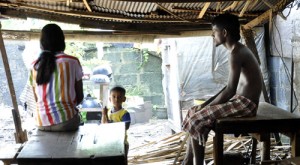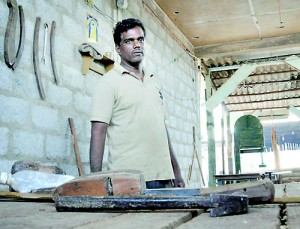News
Proud industry collapses
Nihal R. Mendis, 47, hangs around the shop of a large-scale furniture dealer who buys his furniture, hoping for a loan to buy necessities for his household.
He along with four other carpenters stands there, all waiting for buyers who don’t come to Moratuwa to buy furniture anymore.
Less than a year ago business was thriving and Nihal made good money at the trade his family has practised for generations. Now he is struggling to put food on the table for his family.
His son, who had dropped out of school, like Nimal himself, to join the carpentry workshop has now found temporary work painting wooden toys, and become the current breadwinner of the family. Unable to pay the two other employees who worked for Nihal, he has let them use the workshop to make furniture and sell to customers they find on their own.

What will befall this carpenter and family?
Another carpenter, C. Medis, who had a thriving workshop with three others working under him, has closed down his shop and now works for a big furniture manufacturer. Living in his half-built house without proper doors, floors or even a scrap of decent furniture, the comfortable life he once planned is a distant dream.
Around one in four families in Moratuwa make furniture for a living. Out of the 41,640 families living in Moratuwa, about 10,000 are engaged in carpentry or related industries. Many carpenters who ran small or modest-sized carpentry workshops around Moratuwa are, like Nihal, in dire straits.
“Moratuwa is a unique case where we have an entire furniture industry inside a single town. We have about 10,000 families who depend on carpentry and related industries and it is our responsibility to ensure their interests are protected,” said Postal Services Minister Jeewan Kumaratunga, whose electorate is Moratuwa.
Nihal told the Sunday Times that this year he hit rock-bottom.
“Before the abolition of the licence system we were doing well, but now we hardly ever get a sale. The shop owners also don’t buy from us as they can’t sell the furniture either. I studied only up to Grade 8 and have no other skill than carpentry so it is very difficult for me

C. Medis: Forced to close down his workshop
to take care of my family,” Mr Medis said.
In June 2012 the Government did away with the system that made it mandatory to obtain a permit for the transportation of manufactured furniture, and the measure was confirmed in the recent Budget.
The rationale was to encourage businesses to buy furniture made locally, and boost local business.
But the diversification measure has led to the disintegration of Moratuwa’s decades-old status as the country’s furniture hub.
A once-bustling city of buying and selling furniture has today become a ghost town with almost no buyers in sight.
“We hardly get any customers now – for the last two days we had no business. A

Ven. Beruwela Ananda Thera,
carpenter came yesterday asking for a loan. He wouldn’t leave until we gave him Rs. 3000. I gave it because I knew he wasn’t able to feed his children. But what can we do? There should be a future for the carpenters who have been in this trade all their lives,” says H.D. Somasiri, who runs Chandrika Furniture with his wife, S.T.M. Fernando.
Not so long ago, he said, wholesale buyers came to Moratuwa from all around the country.
Ven. Beruwela Ananda Thera, who has been involved in efforts to find a solution for the issue, explained that the abolition of the permit system gave illegal dealers a loophole to exploit.
“What happens now is these illegal dealers go into the conservation and reserved forest areas, fell the trees and make what they call manufactured furniture while they are in the forest – they are just basic structures. When this happens it is impossible to trace the source of the timber.
“Since they get the timber almost free of charge they can sell the furniture cheaply to shops in the area.
But our carpenters, who have to buy timber through the State Timber Corporation, cannot sell their products. So the Moratuwa-centred system we had has collapsed,” he said.
A leading advocate for the Moratuwa carpenters, Young Men’s Buddhist Federation President Suneth Nuwarapaksha, said the silence of the environmental activists over the issue was inexplicable.
“It is not actual completed furniture (that the rogue tree-fellers make) but wood assembled to resemble a furniture structure. The logs can easily be used for other purposes when they reach their intended destination. There are enough forest reserves in the country for them to infiltrate and this is happening now – we have seen it on TV,” he said.
Environment Ministry secretary B.M.U.D. Basnayake, said the way ahead was unclear.

- Young Men’s Buddhist Federation President Suneth Nuwarapaksha
“Illegal felling happens regardless of whether this permit system is in place or not – that issue is not relevant here. There is, however, an issue with the interpretation of what is known as a piece of ‘completed furniture’, and we have sought the Attorney-General’s advice on the matter. I have also asked for a report from State Timber Corporation,” he said.
Mr. Nuwarapaksha said the entire economic system in Moratuwa was dependent on carpentry. Rattan weavers, cushion workers, labourers who loaded logs and furniture and drivers who transported finished furniture, were all facing difficulties in finding work.
“Moratuwa people were a community who never depended on anyone to provide for them. We were never a burden on the government, we earned enough and we had a quality lifestyle. But now we see the traditional carpenters working as helpers to masons, they are working on highways fixing fences, and some don’t have any work at all. An entire sub-economic system has collapsed.
“We have spoken to Minister Jeevan Kumaratunga,” and he said he had made representations to the President. “We hope the President will understand our plight,” he said.
Mr. Kumarathunga confirmed that he had appealed to the President for help and was holding discussions with the Minister of

A face of despair: Carpenter Nihal Mendis. Pix by Susantha Liyanawatte
Environment about the abolition of the permit system and about establishing clear definitions of completed and half completed furniture.
“We have taken a number of steps to ensure the interests of the traditional carpenters are met. The President has also stated that there will not be space for any illegal activities such as felling trees in forest reserves,” he said.
Environment Minister Susil Premajayantha said his office had held a meeting with members of different organisations representing the carpenter community in Moratuwa.
“We have met most of their demands. One group asked for the licence (permit) system to be lifted and we had sought the Attorney General’s advice.
But since the Budget removed the licence completely there is no more action needed,” he said.
Mr Premajayantha said the Moratuwa community would have to make representations to the Ministry of Finance on the issue.
“If the Ministry of Finance advises us to re-implement the permit system we will do so,” Mr. Premajayantha said.
Moratuwa Furniture Dealers Association President Primal Fernando said the association had made numerous representations to politicians and ministry officials.
“Nothing has come out of the meetings and we are still struggling to sell our products,” he said.
“These decisions were taken to enable a handful of people to transport furniture to hotels and resorts and other business ventures that are coming up in some parts of the country,” Mr Fernando said, speaking to the Sunday Times in his personal capacity as he was unable to speak on behalf of the Association before the discussions on the future course of action scheduled for next week.
Moratuwa Mayor W. Samanlal Fernando said the reason the carpenters found it difficult to sell their products was because they produced in excess of the demand.
“The government has made provision in the Budget to protect the carpenters, making sure that any imported furniture is heavily taxed. We have also made plans to give soft loans to the carpenters.
In addition, we are looking at how they may be able to find jobs abroad as carpenters,” he said.
Mr. Fernando could not provide an adequate explanation as to how a soft loan would help the carpenters if they were already producing excess furniture.
The Mayor said the government would make arrangements for the carpenters to obtain technical skills certificates through the government institutions who provide such training to enable them to secure jobs abroad.
He did not, however offer any solution to the economic difficulties the artisans are facing, nor did he suggest any action to remedy the permits problem.


